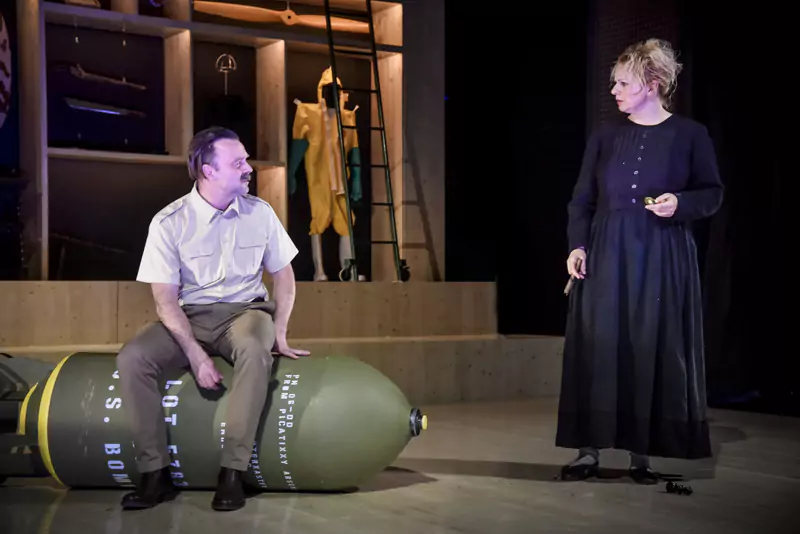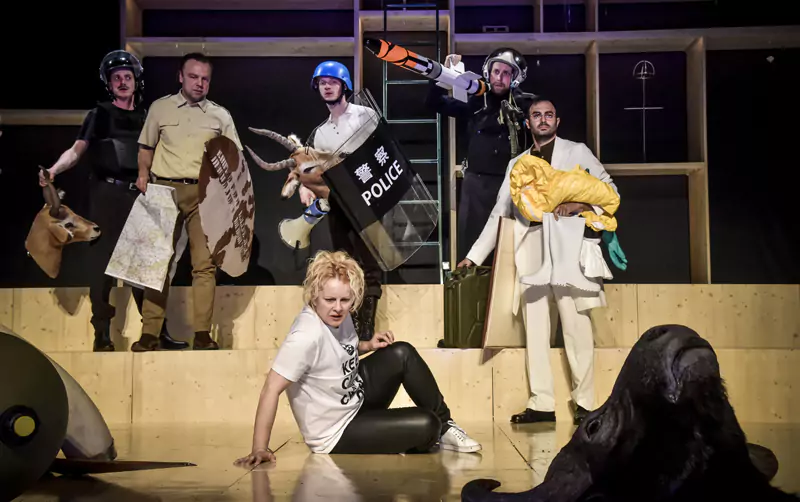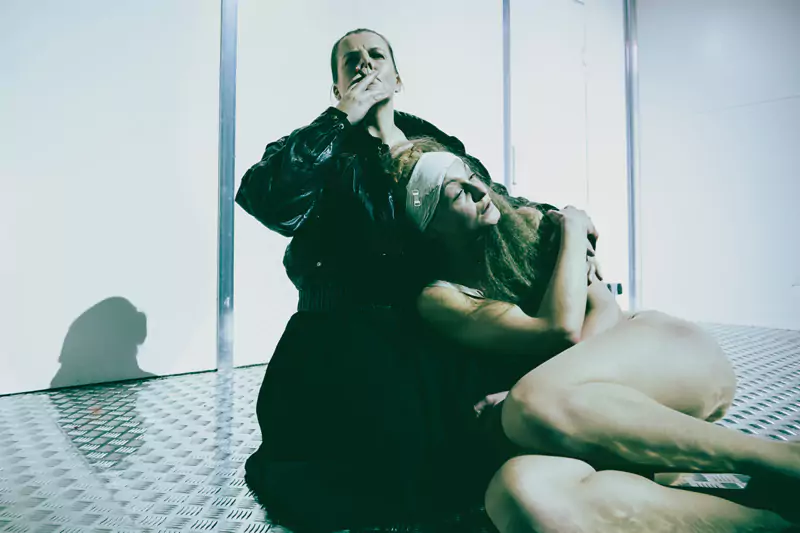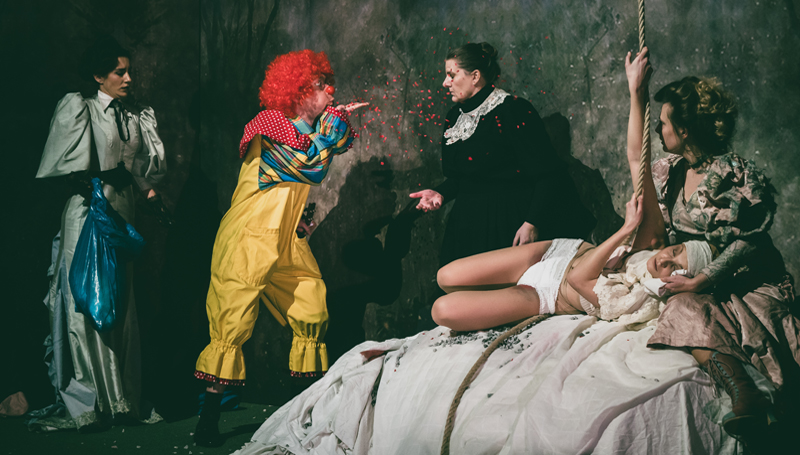Theatre World Brno Festival 2024
Dana Rufolo in the Czech Republic
The International Association of Theatre Critics (AICT-IATC) was invited by PerformCzech with financial backing from the Czech cultural ministry and the EU to hold its biannual congress – and its first since Covid – in the city of Brno, Czech Republic, while the annual festival Theatre World Brno, running from 17 to 28 May, was ongoing.

Tomáš Šulaj and Tereza Groszmannová in Mother.
Photo credit: Marek Olbrzymekl.
I attended the congress, which was on the theme “’Truth’ in the Kafkaesque World of Theatre: Tragic or Comic?”, and this article takes a look at two Czech productions from the theatre festival which I saw during my stay in Brno: Mother (Matka) by the Czech author Karel Čapek and Cries and Whispers, which, while not written by a Czech author, was directed remarkably by the young Czech director Jakub Čermák.
Mother was written by Čapek in 1938 but it could well have been written now. Under the direction of Štěpán Pácl, the play pays riveting attention to what Čapek sees as a mother’s biologically instinctive revulsion to war. A woman gives birth to children who represent the future, but war is an assault on the future and identifies the male child that a mother creates as cannon fodder – nowadays, as drone fodder. The mother character in Čapek’s drama, the only female role in a seven-character play, has lost her husband and three of her five sons to the war machine. A fourth son died as a field scientist who was wedded to the lofty ideals of medical research. She has only one son left alive, Toni, and the military machine (which is identified in the play as embodying masculine values) is already reaching out for him. At the play’s conclusion, Toni too will join the war effort and will presumably die like all the other members of his family, leaving the mother alone and the world no better a place than it was before male intervention.
Mother rejects war outright by appealing directly to our emotions, and therefore the play is a more dramatically effective anti-war play than Čapek’s The White Disease (1937) which sidesteps questions on the morality of war altogether. In The White Disease, a doctor uses his power to call for a stop to war. He is the only researcher to have developed a cure for an endemic disease that resembles leprosy, and he won’t reveal the chemical formula unless war ceases and peace treaties are signed.
The White Disease is structurally similar to Aristophanes’s Lysistrata in that a truce is obtained for reasons which have nothing to do with the characters conceding that war is immoral. But, especially in this production, Čapek’s Mother is a full-throttle attack on the war machine, and in the hands of the talented cast directed by Brno’s National Theatre’s house director Štěpán Pácl for the intimate Reduta Theatre space it is a small gem.

The cast in Mother.
Photo credit: Marek Olbrzymekl.
The play opens with grown actors playing teenaged brothers who are wildly enjoying pretend-fighting with their dead “hero” father’s military equipment: a missile, a sword, gun, a shield … items stored on the living room display shelves that stretch the length of the back wall of the narrow set designed by Antonín Šilar. The boys quarrel and play dead, form teams and counterattack, the twins fight violently and their mother (Tereza Groszmannová) has to intervene. But her boys are possessed by the game of war; they don’t really listen to her and certainly do not heed her. One by one they leave for combat and return, like their father before them, as dead men filling up the living room, explaining why they must obey commands and fight like men. The mother is powerless to change their minds even when she learns from her dead husband (played without any bombastic overtones by Tomáš Šulaj) that he was not a hero as she and their sons had imagined – his was just one more of those pointless deaths due to a commander’s flawed strategy and disregard for his men’s lives.
One of the mother’s sons was the clever child of the family; he did not die in battle but instead as a doctor researching a cure for yellow fever in Africa where he succumbed to malaria. He explains that he participated in advancing medical knowledge, and that justifies his premature death. His sacrifice advanced science and so was not in vain.
Another son perishes because he takes it upon himself to make an altitude flight test on his military plane. He flies above the flight ceiling of his aircraft, the wings rip off, and he crashes. But as a dead character, he tells his mother that nothing can take away the exhilaration he experienced in having seen how high the plane flew before breaking up.
The twins die in a clash between police and protestors, each son on oppositive sides. There’s only one son left, awkward Toni (Pavel Čeněk Vaculík). Mother calls him her delicate child – her poet and dreamer. She refuses to let him go to war and insists that he hides with her in the cellar of their house. Even when all her menfolk return from the dead to beg her to let the youngest go to war, she is adamant. This son is mine! He will not go into combat!
Groszmannová plays her role as a frustrated but proud earthy mother, overwhelmed by her stubborn sons and by trying to make ends meet without a husband to help her; and she also plays the symbolic mother, who has been pleading for peace for “thousands of years”. Her vocal control is superb: a rumbling voice that is loud and forceful but which never swerves into screeching or hysteria. The men are played with great skill as mad fools but loveable. Their mother or wife respects her men; she understands the eons-old system of belief that has prompted them to self-sacrifice. But she simply does not believe in that system. She believes in the rights of motherhood, the right to keep people alive. It is in fact that right which prevails in the author’s decision to have the dead on stage as flesh-and-body actors, living characters representing the dead (instead of skeletons or ghosts).
At the drama’s end, the mother surrenders her son Toni and tells him to become a soldier. She has just heard the news on television that children are being executed by enemy soldiers, and that news causes a reversal in her attitude. She introspectively declares that she has been selfish, that she has been motivated by a fear of loneliness. And yet, Groszmannová does not signal the reversal of her former position clearly. The character speaks with the same tone of voice, her comportment and posture are similar, and she is neither sagging from defeat nor whimpering with remorse. The actress declares her selfishness without conviction. It is as if she is reciting the words of the playwright, not living them.
I’ve thought good and hard about the fact that Groszmannová did not physicalize the transition and have come to the conclusion that in this contemporary interpretation, Pácl instructed her to play the scene in that way precisely because it is important for us to understand that she doesn’t really believe in her new attitude. Academics have said that in this last scene Čapek wishes to show that the conflicting world view forces the mother to understand the pragmatic nature of war, for the insanity of other men who betrayed the rules of war by killing civilians has obliged her to re-view her position.
However, in this contemporary interpretation, the actress reveals that the killing side of human personality has not won. No, the mother has simply yielded in a skirmish. The battle is to fight for the end of battle, and she remains conscious of this greatest goal even as she places the rifle in her last living son’s hands. Intellectually, she has reversed her position, but emotionally she has not. So, Groszmannová played out the ambiguity and contradiction by dampening her change of heart. Even in this curious final scene, the insistence on the immorality of war is the focus.
I noticed that this interpretation of the ending of Matka emphasizes the murky area where thought transitions into words. So when we theatre critics were given the opportunity to visit the town of Moravský Krumlov to look at the Slav Epic painted by Alfons Mucha – who honed the skill of getting ordinary people to dress in costumes and pose as models to be incorporated into historical settings – and this same theme popped out at me during the visit, I took note. It was when I was standing before “The Slav Epic cycle No.10: The Meeting at Křížky. The Magic of Words” (which Mucha painted in 1916) a piece that honours the birth of the Slavic language and associates it with a sense of shared community. Could there be, at the centre of the Czech ethos, a particular heightened interest in the transactional space where the shift from the self to the collective, via the intermediary of language, takes place?
In effect, the importance of a shared language as an expression of a shared worldview is also evident in Mother where the men speak one kind of language, the language of war, and the mother speaks another, the language of peace.
~~~
The other play that I am writing about from the Theatre World Brno Festival is Cries and Whispers which takes an opposite attitude towards language and, significantly, is not written by a Czech. It is based on Viskningar Och Rop, which literally means ‘whispers and cries’, the 1972 film written and directed by Ingmar Bergman. This production, staged by Jihlava’s Horácké Theatre at the Brno City Theatre, reveals the insolvency of language compared to the demands of the flesh. Cries and Whispers is not a Czech play, but the Czech director Jakub Čermák has chosen a visceral approach to staging the film script, emphasizing relationships and not about what people say to each other.

Patient and care-giver in Cries and Whispers.
Photo credit: Igor Stancik.
The audience reacted strongly to this production, with a clear division between those who saw it after having seen Bergman’s film and who therefore found the play vulgar and odious, and those – myself included – who had not seen the film; we found it intriguing and gripping.
Cries and Whispers stages the dying process and the process of being trivialized once one is dead; it is a gaspingly sad portrayal of the meatiness of the human body, as much subject to decomposition as unrefrigerated filet mignon. Moments of exuberance – a sexual encounter between two ex-lovers, a comic clown who encourages everyone to laugh at the incremental losses of dignity a dying person undergoes – are intelligently there to balance out the decay the drama portrays. And the actors are superb.
There are three sisters; they have already lost their mother who, one sister’s diary states, was “very angry” when she found out not only that she was sick, but that she would have to die (many in the audience chuckled when they heard this line – or read it, if they had to rely on surtitles in English). But now it is one of the sisters who must die, and she is not very angry. Rather, she sinks into death, getting progressively weaker in front of our eyes, painfully, and releasing bodily odors as she does so – we need not smell anything, but the characters on stage liberally use a spray can of fragrance (water, I am sure) to indicate they are trying to mask the stench. This in itself was an insight into the nature of theatre: they play-acted a body giving off odors, which is a delightful reminder of the mimetic nature of theatrical presentation.

The living sisters in Cries and Whispers.
Photo credit: Igor Stancik.
The actors repeated the bedside routine with precision: the patient dirtying herself (she pours a bucket of small rocks or something similar over herself repeatedly), her being cleaned, fitted with a new outfit, getting a shot, being fed … the routine of a sickroom establishes the notion of circularity and endurance which reassuringly works against the inevitability of death. Remarkably, these acts of caregiving do not become absurd even though they are repeated, and this is because the patient is always the centre of our attention; the acts of care she receives are for her and not ends in themselves.
Once this sister is dead and her body is placed in a morgue, her two sisters turn away from her and back to life. The clown gets them to make farting sounds –and the shiest sister suffers agonies of humiliation trying to play along. But the dead sister is still a presence, and she calls out, asking her sisters to come and stay beside her, to keep her company. They haven’t time for her any longer; they have their own families, their own projects. One sister says she doesn’t care about her all that much, actually. It is the caregiver ultimately who comes in and sits next to her, smoking a cigarette to wile away the time.
Teeth-brushing also has symbolic significance in this play, with the opening scene involving the caretaker simultaneously brushing her own teeth and smoking a cigarette; the good and the bad, all mixed up together and utterly physical, not moral.
Yes, the production is vulgar, but the vulgarity is a metaphor for the impossibility of sustaining spirituality and lofty thoughts and conversation when the body is entering a state of entropy and the person it enrobed is turning into ether. The production is a brilliantly crafted demonstration of the heaviness of being body.









